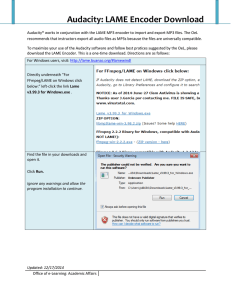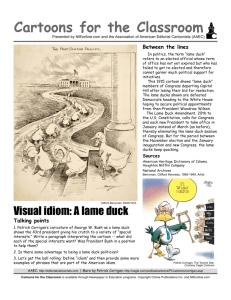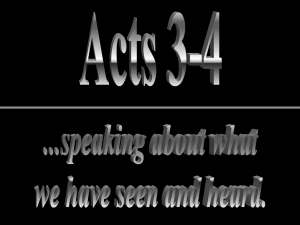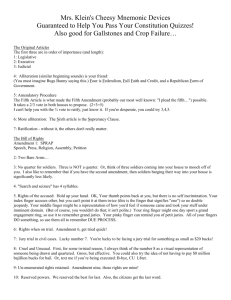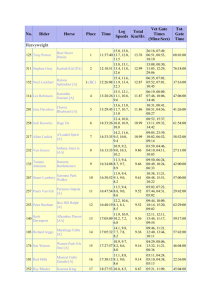File
advertisement
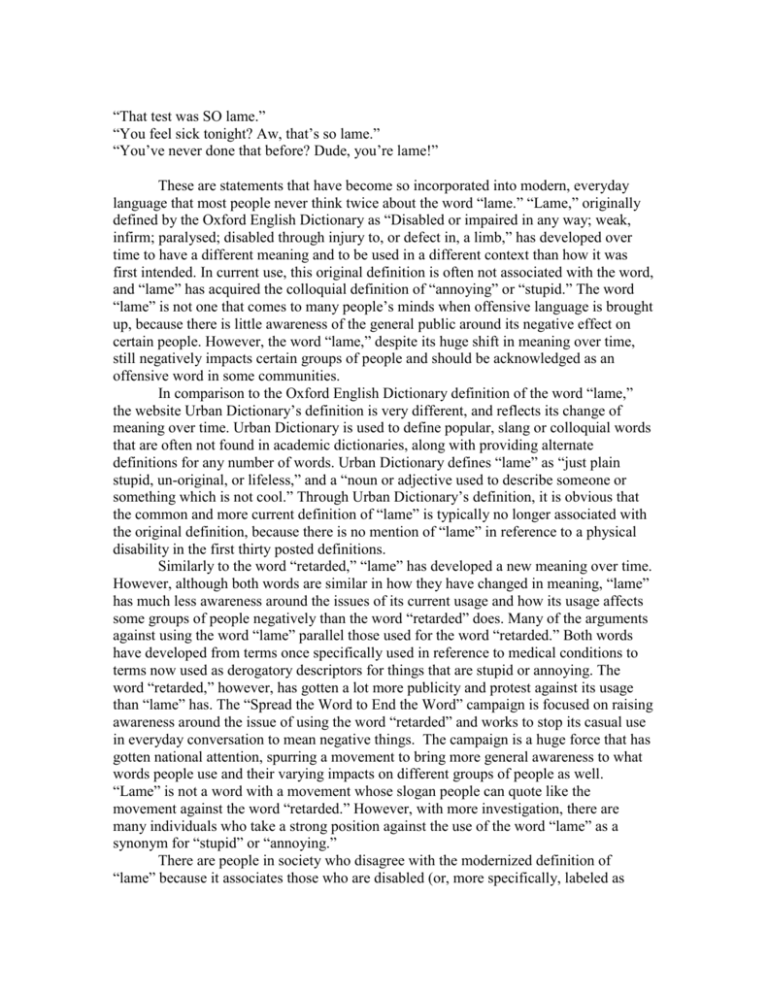
“That test was SO lame.” “You feel sick tonight? Aw, that’s so lame.” “You’ve never done that before? Dude, you’re lame!” These are statements that have become so incorporated into modern, everyday language that most people never think twice about the word “lame.” “Lame,” originally defined by the Oxford English Dictionary as “Disabled or impaired in any way; weak, infirm; paralysed; disabled through injury to, or defect in, a limb,” has developed over time to have a different meaning and to be used in a different context than how it was first intended. In current use, this original definition is often not associated with the word, and “lame” has acquired the colloquial definition of “annoying” or “stupid.” The word “lame” is not one that comes to many people’s minds when offensive language is brought up, because there is little awareness of the general public around its negative effect on certain people. However, the word “lame,” despite its huge shift in meaning over time, still negatively impacts certain groups of people and should be acknowledged as an offensive word in some communities. In comparison to the Oxford English Dictionary definition of the word “lame,” the website Urban Dictionary’s definition is very different, and reflects its change of meaning over time. Urban Dictionary is used to define popular, slang or colloquial words that are often not found in academic dictionaries, along with providing alternate definitions for any number of words. Urban Dictionary defines “lame” as “just plain stupid, un-original, or lifeless,” and a “noun or adjective used to describe someone or something which is not cool.” Through Urban Dictionary’s definition, it is obvious that the common and more current definition of “lame” is typically no longer associated with the original definition, because there is no mention of “lame” in reference to a physical disability in the first thirty posted definitions. Similarly to the word “retarded,” “lame” has developed a new meaning over time. However, although both words are similar in how they have changed in meaning, “lame” has much less awareness around the issues of its current usage and how its usage affects some groups of people negatively than the word “retarded” does. Many of the arguments against using the word “lame” parallel those used for the word “retarded.” Both words have developed from terms once specifically used in reference to medical conditions to terms now used as derogatory descriptors for things that are stupid or annoying. The word “retarded,” however, has gotten a lot more publicity and protest against its usage than “lame” has. The “Spread the Word to End the Word” campaign is focused on raising awareness around the issue of using the word “retarded” and works to stop its casual use in everyday conversation to mean negative things. The campaign is a huge force that has gotten national attention, spurring a movement to bring more general awareness to what words people use and their varying impacts on different groups of people as well. “Lame” is not a word with a movement whose slogan people can quote like the movement against the word “retarded.” However, with more investigation, there are many individuals who take a strong position against the use of the word “lame” as a synonym for “stupid” or “annoying.” There are people in society who disagree with the modernized definition of “lame” because it associates those who are disabled (or, more specifically, labeled as “lame” through medical terminology) with negative and demeaning attributes. These opinions are voiced on blogs, in articles and in comments online. On the blog Alas!, an article was posted entitled “Why Not to Use The Word Lame: I Think I’m Starting to Get It.” In this post, the author, Mandolin, writes that although “having functional legs is useful” and “the state of having legs which are not as functional as other legs is not as nice as the state of having normally functional legs,” it does not mean that people who are disabled like being associated with negative and depreciating words, or as Mandolin emphatically puts it, “BEING THE CULTURAL GO-TO FOR THINGS THAT SUCK.” When a word is used as casually and as often as “lame” is, it is important to remember that language has meaning that can be personally offensive to groups, and “lame” is a word that is often overlooked. “Lame” is listed in the “List of Disability-Related Terms with Negative Connotations” on Wikipedia. Countless blog posts describe strong feelings toward the word “lame” and how use of the word “lame” is “an idea that serves to marginalize disabled individuals” (Lesley, 2012). It is true that not every word and conversation can be censored to fit every individual’s idea of what language is acceptable and what is not. This would leave conversations opinion-less and boring, and learning and development between people would not progress. However, it is important to be aware of language and the power it can hold for particular communities of people. The word “lame” is not one that comes to many people’s minds when offensive language is brought up, but, even with its widely used modern definition, it still has a strong influence on particular communities and individuals. Works Cited Lesley. "NEW BAD WORDS: AN INCOMPLETE COMPENDIUM OF POTENTIALLY OFFENSIVE LANGUAGE, FEATURING “LAME,” “RETARDED,” AND MANY MORE." Web log post. XoJanecom RSS. SAY Media Inc., 13 Dec. 2012. Web. 20 Sept. 2013. <http://www.xojane.com/issues/new-bad-words-lame-retarded-stupid-crazy-trannyghetto>. Mandolin. "Why Not to Use the Word Lame: I Think I'm Starting to Get It." Alas! A Blog. WordPress, 16 June 2009. Web. 15 Sept. 2013. <http://amptoons.com/blog/2009/06/16/why-not-to-usethe-word-lame-i-think-im-starting-to-get-it/>.
